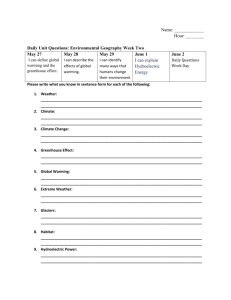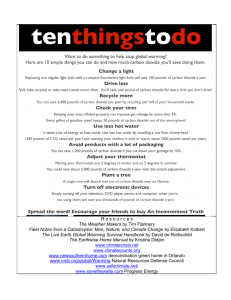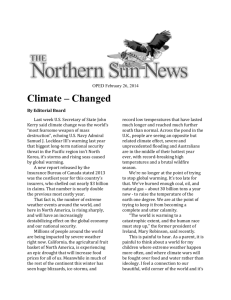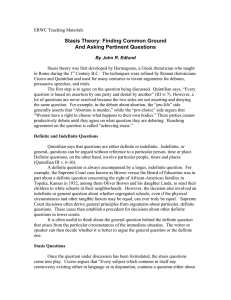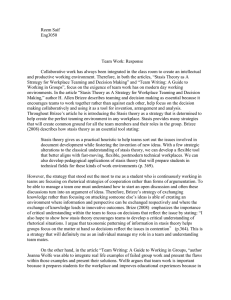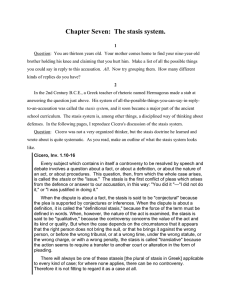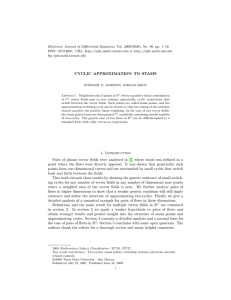Write Right An Overview of Academic Writing “Read, read, read
advertisement
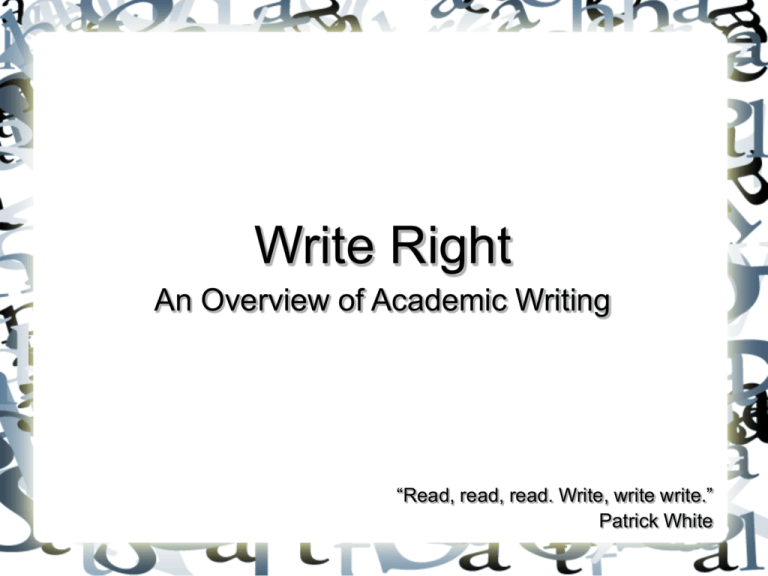
Write Right An Overview of Academic Writing “Read, read, read. Write, write write.” Patrick White What do you expect from this presentation? Is WRITING important to your growth as a scientist and professional? Where do you place WRITING as a skill on a scale of 1 to 5 and why? The 5 Steps The Germ The Map Revision & Rewriting Academic Writing Grammar & Stylistic Elements Critical Thinking & Logic in Argument Incubating the Germ Guess what? Which is the challenge. Prove it! Which you will do through research. Then the last challenge... So what? Was all that work worth it? Are you adding something new to your area of knowledge? Stasis Theory It is a theory which writers use in investigation and when trying to determine a question. The Facts (Conjecture) The Meaning or Nature of the Issue (Definition) The Seriousness of the Issue (Quality) The Plan of Action (Policy) The Inquiry FACT DEFINITION What are the facts? Did something happen? What is the nature of the problem? Is there a problem or issue? What kind of a problem is it? How did it begin and what are its causes? To what larger class of things or events does it belong? What are its parts and how are they connected? What changed to create the problem? Can the facts be changed? And QUALITY POLICY Is it a good thing or a bad thing? Should action be taken? How serious is the problem or issue? Who all should be involved? Whom might it affect? What happens if you do nothing? What should be done about the problem? What needs to happen to solve the problem? What are the costs? Using The Stasis Theory Should we take action to stop Global Warming? Fact or Conjecture (Does it exist? Did it happen?) Is climate on Earth changing? If so, is it getting warm, cold or both? How and when did these changes begin? What factors are causing these changes? Are humans responsible? Or is it natural? Can these changes be slowed down or stopped? Definition or Nature (How can the event be defined?) Are these climatic changes really global warming or are they something else? Then how should global warming be defined? What is its connection with other aspects of climate change? How does it fit into the theory of the ice age which was due to climate change too? What are the different parts of the process of climate change? Using The Stasis Theory Should we take action to stop Global Warming? Seriousness & Quality (What is the character of the act?) Is climate change detrimental? Is it right to try and stop it? Economic growth versus energy conservation? Which is important, short-term economic prosperity or long-term environmental stability? Policy or Plan of Action (What should be done?) Should we attempt to stop climate change? What are the implications if we do nothing? Should we reduce greenhouse gases? Should we conserve energy? Is nuclear power an option? Will these steps reduce global warming? Will these actions lead to other problems? Brainstorming Make a Mind Tree with the Issue or Problem in the center and branches radiating outwards. Ask why you are a writing this essay or paper Diagram your major points Write down everything – the good & bad points Don't censor Anticipate the questions the reader would ask Ask the Journalistic questions: Who? What? Where? When? Why? How? So What? The Thesis Statement Analytical , Expository or Argumentative Specific Debatable Should describe only what you plan to discuss in your paper Ex: Pollution is bad for the environment. Narrow Ex: Drug use is detrimental to society. What is Critical Thinking? An unexpected insight or original thought An acute discrimination of facts To be able to differentiate between theory and practice The capability to combine both a logical and original opinion How to Think Critically? Are terms defined and by what criteria? How reliable is the source? How relevant is the point in discussion? Question the question itself. Are claims supported by evidence? Is there consistency in an argument? What is left unexplained in the argument? Can the claims be verified and how? Is the writer biased in any way? Don't accept published material at face value. Always double check references for yourself . Logic in Arguments Slippery Slope Ex: If we ban all luxury cars with low mileage because they are bad for the environment, then the government will eventually ban all cars, therefore we should not ban luxury cars. Post Hoc Ergo Propter Hoc (After this, therefore because of this) Ex: I ate out yesterday and I am sick, so the food must have made me sick. Genetic Fallacy Ex: The TATA Nano will be a bad car because it displaced and caused injustice to X number of farmers in Singur. Bagging the Claim Ex: Filthy and polluting industries should be banned. Either/Or Ex: We can either stop using cars or destroy the world. Ad Hominem Ex: The paper in question is written by a professor at JNU, so it is bound to have leftist and socialistic traits. Ad Populum Ex: If you are a true Indian you will support the moral policing practiced by certain factions in the country. Red Herring Ex: The level of mercury in seafood may be unsafe, but what will the fishermen do to support their families? Grammar & Stylistic Elements Succinctness Use specific words. Avoid vagueness. The speaker spoke about several of the merits of writing without using small and redundant words in his speech. (19) The speaker elucidated concise writing in his speech. (8) Vivek believed but could not confirm that Ritika had feelings of affection for him. (14) Vivek assumed that Ritika adored him. (6) Many have made the wise observation that when a stone is in motion rolling down a hill or incline that, that stone is not likely to be covered all over with the kind of thick green moss that grows on stationary unmoving things and becomes a nuisance and suggests that those things haven't moved in a long time and probably won't move anytime soon. (67) A rolling stone gathers no moss. (6) Question every Word Combine Sentences This lecture talks about writing. It explains good writing. It shows ways in which we can improve our writing. Some parts were useful. Other parts were not. (27) This lecture is about good writing and suggests both useful and not so useful aspects to improve this skill. (19) Eliminating Words Eliminate Determiners & Modifiers Remove Redundant Pairs kind of, sort of, type of, really, basically, actually, generally past memories, each individual, end result, free gift, true facts, terrible tragedy, past history, very unique Remove Redundant Categories Large in size, of a bright color, round in shape, of an uncertain condition, extreme in degree, in a confused state Changing Awkward Phrases Convert Phrases into Single Words or Adjectives The students with ambition. The ambitious students. The department showing the best performance. The best performing department. Convert 'That', 'Who' and 'Which' Clauses into Phrases The report which was released recently. The recently released report. The system that is most efficient and accurate. The most efficient and accurate system. Change Passive Sentences into Active Voice An experiment was done by Ramesh. Ramesh did an experiment. Your figures were checked by the research department. The research department checked your figures. Revision & Rewriting Macro Editing Structure of the essay/thesis/paper The manuscripts relevance to the original question and your discussions Do the introduction and conclusion correlate Logic Irrelevant discussions Are paragraphs linked correctly Micro Editing Grammar Spelling Punctuation Referencing Sources 1. 2. 3. 4. Easy Writer, Stephen McLaren Science and Technical Writing, Philip Rubens Online Writing Lab at Purdue (OWL at Purdue) “Stasis Theory: Finding Common Ground and Asking Pertinent Questions,” John R. Edlund 5. A useful resource : http://www.thefreedictionary.com/

